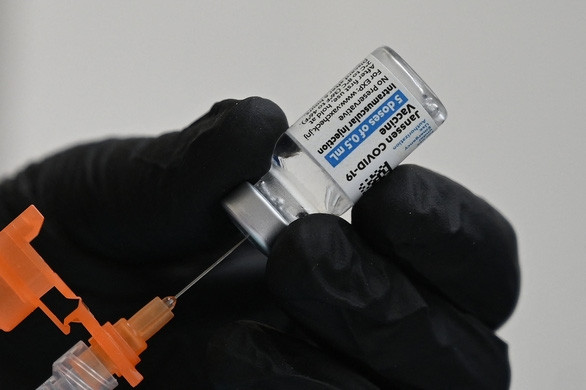According to a preliminary study by the US National Institutes of Health (NIH) published on October 13, people who received the first dose of the Johnson & Johnson vaccine and received a second booster dose using mRNA technology had antibody levels that were superior to those who received the same type of vaccine.

Johnson&Johnson's Covid-19 vaccine (official name: Janssen) at an injection site in California (USA)
In the study conducted by the US National Institutes of Health (NIH), researchers organized volunteers into nine groups of about 50 people each.
These people were given one of the three vaccines authorized for emergency use in the US (Pfizer, Moderna and Johnson & Johnson), followed by a booster shot. Three groups were given the same vaccine, and six groups were given a booster shot with a different vaccine.
Researchers found that people who received the Johnson & Johnson (J&J) shot followed by a Moderna booster shot had a 76-fold increase in antibody levels within 15 days, while those who received the J&J booster shot had a four-fold increase in the same time period.
Similarly, a Pfizer-BioNTech booster shot raised antibody levels in people who got the first J&J shot by 35-fold.
Still, the team cautioned about the small size of the study and not following the volunteers long enough to determine whether they experienced rare side effects.
J&J was once considered a "game changer" when the Covid-19 vaccine it developed only required a single dose.
About 15 million people in the US have already received the J&J vaccine and are anxiously awaiting the question: is a second booster shot needed?
The data J&J provided to support the need for a booster shot was “weak,” according to the US Food and Drug Administration (FDA). The preliminary study, released on October 13, is sure to heat up the debate over the second dose of the J&J vaccine.
In addition to J&J, the FDA is also considering a booster shot for people who have received the Moderna vaccine. A group of scientists at the agency said that the shot is not necessary because the second shot is still highly effective.
The FDA’s vaccine advisory panel will meet on October 14 and 15 to vote on whether to give Moderna and J&J booster shots. The CDC’s vaccine advisory committee will also meet next week to vote on the same topic.
If both agencies agree, Americans could get booster shots of the J&J, Moderna vaccines as early as next week.
On September 21, J&J announced the results of a clinical trial showing that if the second injection is given about 8 weeks after the first injection, the risk of patients having mild to severe symptoms will be reduced by 94%. The effectiveness of the first injection is 74%.
According to J&J, the amount of antibodies when injected 2 times within 8 weeks after the first dose will increase from 4 to 6 times. Another test also conducted by J&J showed that if injected 2 times about 6 months after the first dose, the amount of antibodies will increase up to 12 times.
According to Tuoi Tre